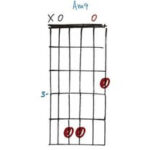The guitar. It’s more than just wood and strings; it’s an instrument of expression, a tool for crafting melodies that resonate across genres and generations. Imagine a world without the soaring solos, the rhythmic strumming, the sheer emotional depth that guitars bring to music – it’s almost unimaginable. From the humble beginner’s acoustic to the high-performance electric axes wielded by legends, guitars are fundamental to the music we love.
Each guitar brand is like a painter with a unique sonic palette. Some are steeped in history, honoring time-honored traditions and crafting instruments with vintage vibes. Others push the boundaries of innovation, blending cutting-edge technology with imaginative designs to forge new sonic territories. Whether you aspire to create soulful blues, blistering rock anthems, delicate folk tunes, or anything in between, there’s a guitar brand out there perfectly suited to your musical vision. This guide is designed to help you navigate the landscape of guitar manufacturers and discover which brand aligns with your playing style, preferences, and aspirations.
It’s important to note that this isn’t a ranked list, and we won’t be declaring one brand definitively “the best.” The “best” guitar brand is subjective; it depends entirely on your individual needs, musical style, and personal taste. While we focus on brands renowned for quality, innovation, and wide appeal, many excellent companies – including boutique builders like Suhr and Mayones, and established names like D’Angelico and Charvel – are not explicitly listed here. Our aim is to spotlight brands that, through extensive testing and industry experience, we recognize as leaders in build quality, product range, and innovation, offering outstanding choices for a wide spectrum of players.
So, from the iconic Fender and Gibson to the modern designs of Taylor and Strandberg, let’s explore the defining characteristics of some of the Top Guitar Brands. We’ll delve into their core values, signature sounds, and what makes each brand stand out in the diverse world of guitars.
Best Electric Guitar Brands
(Image credit: Future)
1. Fender/Squier
Best for: Tonal versatility and iconic designs
Fender is, without a doubt, one of the most recognizable and influential names in the history of guitars. Leo Fender’s revolutionary designs for electric guitars, basses, and amplifiers fundamentally reshaped modern music. His impact is undeniable, and the vibrant soundscape of contemporary music owes a significant debt to his innovations.
Responsible for pioneering the mass-produced solid-body electric guitar with the groundbreaking Broadcaster (later the Telecaster), Fender established itself as a cornerstone of the music industry. Known for their bright, articulate, and shimmering tones, and often finished in eye-catching colors, Fender guitars like the Stratocaster, Telecaster, Jazzmaster, and Jaguar are celebrated for their versatility. They are perfectly at home across a vast spectrum of genres, from blues and indie to alternative rock, punk, jazz, and beyond.
If you seek a guitar with a rich heritage and exceptional adaptability, Fender is an ideal choice. Furthermore, Fender offers quality instruments across a wide range of budgets. Squier, Fender’s sister brand, provides incredibly affordable entry points; the Mexican-made Player Series delivers outstanding value in the mid-price range; and the American-made models represent some of the finest production guitars available.
(Image credit: Future)
2. Gibson/Epiphone
Best for: Classic rock, hard rock, and blues tones
Gibson is synonymous with rock and roll history, but their story began long before the genre’s explosion. Founded by Orville Gibson in 1894, this now-dominant guitar giant originated from a modest workshop in Kalamazoo, Michigan. Initially crafting mandolins and acoustic instruments, Gibson evolved to become a leader in electric guitars, basses, and amplifiers.
With over a century in the guitar business, Gibson’s legacy is built upon some of the most iconic and influential guitars ever created. From the legendary Gibson Les Paul, revered for its rich sustain and powerful voice, to the sophisticated semi-hollow ES-335, and classic acoustics like the J-45, Gibson’s catalog is filled with instruments that have shaped music history. Models like the SG, Flying V, Explorer, and Firebird further solidify Gibson’s enduring impact.
Similar to Fender, Gibson also provides accessible options through its sister brand, Epiphone. Acquired by Gibson in 1957, Epiphone began in 1986 to produce more budget-friendly versions of Gibson’s iconic designs, making the classic Gibson aesthetic and vibe attainable for a wider range of players.
To explore the pinnacle of Gibson’s quality, prestige, and innovative spirit, delve into guides showcasing the best Gibson guitars available.
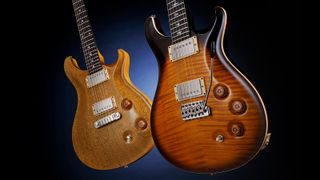 Two PRS electric guitars, one blue and one gold, displayed against a dark blue backdrop
Two PRS electric guitars, one blue and one gold, displayed against a dark blue backdrop
(Image credit: Future)
3. PRS/ PRS SE
Best for: High-end craftsmanship and visually stunning finishes
If you’re looking for a guitar brand that embodies exceptional build quality and breathtaking aesthetics, PRS (Paul Reed Smith) stands out. Since its inception in 1985, PRS has become a pioneer in modern guitar manufacturing, masterfully blending artistry and precision to create instruments that are as beautiful to look at as they are to play.
Based in Maryland, PRS offers a diverse range of models categorized into Core, Bolt-On, S2, SE, and Private Stock lines, ensuring that players at various price points can experience PRS quality. The most recognizable PRS model is undoubtedly the Custom 24, a flagship instrument available in various iterations, from high-end masterpieces to more accessible versions. The SE Custom 24, in particular, consistently ranks among the best electric guitars under $1,000. Celebrated for its striking flame maple tops, vibrant finishes, signature bird inlays, and powerful, versatile tone, the Custom 24 delivers on every front.
For guitarists who value both sonic excellence and visual artistry, PRS guitars offer an unparalleled combination of performance and beauty.
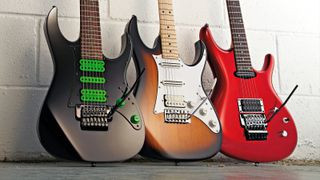 Three Ibanez electric guitars of different models and colors standing against a white wall
Three Ibanez electric guitars of different models and colors standing against a white wall
(Image credit: Future)
4. Ibanez
Best for: Fast playing and shredding styles with thin necks
Ibanez is often hailed as the weapon of choice for shredders and virtuoso guitarists. While renowned for producing high-performance instruments favored by speed players, the Japanese brand’s origins are surprisingly humble. Ibanez began as the musical instrument division of the Hoshino Shoten bookstore chain in Japan. Initially importing Spanish guitars by luthier Salvador Ibanez, they eventually began crafting their own instruments, drawing “inspiration” for their name from their early imports.
Today, Ibanez is synonymous with fast-playing necks and super-Strat designs, attracting a roster of loyal artists including guitar icons like Joe Satriani, Steve Vai, Paul Stanley, Nita Strauss, and Mick Thomson. Ibanez guitars prioritize playability, typically featuring wide, thin neck profiles, high-output pickups, and advanced tremolo systems. If your playing style leans towards high-speed legato runs, intricate tapping, and down-tuned riffing, Ibanez could be the perfect brand to fuel your musical explorations.
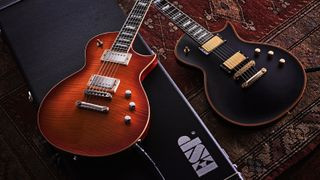 Two ESP E-II Eclipse electric guitars in different finishes on top of a guitar case
Two ESP E-II Eclipse electric guitars in different finishes on top of a guitar case
(Image credit: Future)
5. ESP/LTD
Best for: Metal and heavy music genres
Another prominent Japanese brand, ESP (Electric Sound Products), started modestly as a custom guitar parts provider. It has since evolved into a leading force in the world of metal guitars. While ESP, and its more affordable LTD line, do offer guitars suited for various genres, they are most strongly associated with instruments designed for heavier styles of music.
The ESP Eclipse model is perhaps the brand’s most iconic offering, known for its streamlined, Les Paul-inspired body shape, comfortable thin neck, and aggressive, high-output pickups. The Eclipse is available in a range of finishes, configurations, and price points, making it accessible to a broad spectrum of metal players.
ESP’s reputation in the metal community is solidified by its impressive roster of endorsing artists. Metal titans like Metallica’s James Hetfield, Megadeth’s Dave Mustaine, Alexi Laiho, Bill Kelliher, Max Cavalera, and Will Adler all rely on ESP guitars to achieve their signature, bone-crushing tones.
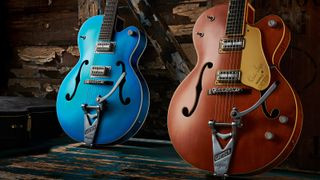 Two Gretsch hollow body guitars, one orange and one white, against a blurred background
Two Gretsch hollow body guitars, one orange and one white, against a blurred background
(Image credit: Future)
6. Gretsch
Best for: Vintage tones, country twang, and rockabilly styles
The quest for “that Gretsch sound” has captivated guitarists for decades and continues to do so. Characterized by a sparkling high-end, resonant midrange, and warm, full lows, the Gretsch tone is timeless and distinctive. With a devoted following that includes legends like George Harrison, Chet Atkins, Eddie Cochran, and Bo Diddley, as well as modern innovators like Jack White, John Frusciante, and Pat Smear, Gretsch’s influence spans generations and genres.
Gretsch guitars, often featuring large bodies and Bigsby vibrato systems, evoke a vintage charm with their classic aesthetics, comfortable playability, and retro-inspired tones. They have become staples in country and rockabilly music, with their stylish hollowbody designs providing the rhythmic and harmonic foundation for these genres.
With a history spanning over a century, Gretsch offers a wide catalog of models to suit various players. From the budget-friendly Streamliner series to the popular Electromatic line and the handcrafted Professional Collection, there’s a Gretsch guitar for diverse playing styles and budgets.
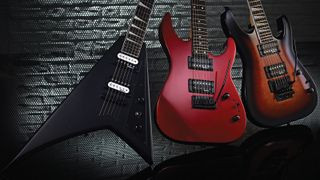 Two Jackson electric guitars with sharp, angular designs, set against a brick wall and metal grating background
Two Jackson electric guitars with sharp, angular designs, set against a brick wall and metal grating background
(Image credit: Future)
7. Jackson
Best for: ’80s shred, high-speed playing, and aggressive styles
Jackson Guitars emerged in the late 1970s, coinciding with the rise of a new breed of guitar virtuoso – the glam metal shredder. Focused on crafting high-performance instruments designed for technical prowess, Jackson quickly became a prominent name in the shred guitar world.
By the mid-1980s, what began as a small guitar repair shop in Southern California had become a leader in the “super guitar” movement, characterized by pointy headstocks and hot-rodded features. Today, Jackson guitars remain highly sought-after by modern metal players, with artists like Misha Mansoor, Mark Heylmun, Chris Broderick, and Rob Caggiano all having signature Jackson models.
Popular Jackson models include the Dinky, Rhoads, Soloist, and Kelly. Each of these designs offers distinct tonal characteristics, playing feels, and visual aesthetics, inviting players to explore the range and find their ideal Jackson instrument.
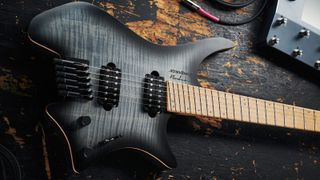 A Strandberg Boden electric guitar in a natural finish on a stage, next to a multi-effects pedal
A Strandberg Boden electric guitar in a natural finish on a stage, next to a multi-effects pedal
(Image credit: Future)
8. Strandberg
Best for: Headless guitar designs and ergonomic playing experiences
Based in Uppsala, Sweden, Strandberg Guitars represents a distinctly modern approach to guitar design, pushing the boundaries of traditional instrument construction. Their Ergonomic Guitar System is central to the brand’s identity and design philosophy.
A single glance at a Strandberg guitar reveals its departure from conventional designs. Featuring headless necks and uniquely sculpted, lightweight bodies, Strandberg guitars are at the forefront of contemporary guitar innovation.
Strandberg instruments have gained favor among players who demand peak performance and ergonomic comfort. Artists such as Ben Kenney of Incubus, Randy McStine of Porcupine Tree, and Per Nilsson of Scar Symmetry are often seen wielding Strandberg guitars.
For those intrigued by the world of headless guitars and their unique benefits, exploring guides dedicated to the best headless guitars is highly recommended.
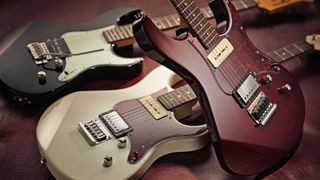 Three Yamaha electric guitars in different colors and models displayed together
Three Yamaha electric guitars in different colors and models displayed together
(Image credit: Future)
9. Yamaha
Best for: Beginner guitarists seeking reliable and affordable instruments
Yamaha is a global giant in the musical instrument industry. From pianos and ukuleles to keyboards, drum kits, and guitars, Yamaha offers a comprehensive range of musical equipment.
Yamaha began producing guitars in 1966 and has since become one of the most trusted names in the industry, particularly among beginner guitarists. The Yamaha Pacifica series is a student favorite, renowned for its exceptional value, playability, and quality construction at an accessible price point. In fact, the Pacifica often tops lists of the best beginner electric guitars.
If you’re searching for a dependable, affordable, and great-sounding instrument to start your guitar journey, Yamaha guitars are an excellent choice.
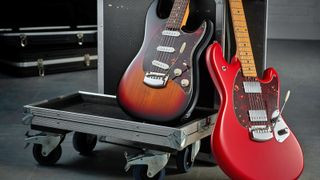 Music Man electric guitars in various colors and models on a flight case
Music Man electric guitars in various colors and models on a flight case
(Image credit: Future)
10. Ernie Ball Music Man
Best for: Effortless playability and distinctive, modern style
Founded in 1974, Music Man is another iconic brand that has significantly shaped the landscape of electric guitars and basses. Models like the StingRay, available in both guitar and bass versions, were instrumental in establishing the company’s reputation, and these instruments remain highly popular today.
In 1984, Music Man was acquired by Ernie Ball, the renowned guitar string manufacturer, who continued to uphold the brand’s commitment to quality and innovation.
Today, Music Man guitars are trusted by a diverse range of players seeking exceptional performance and unique aesthetics. Artists like St. Vincent, John Petrucci, Steve Lukather, and Albert Lee are frequently seen performing with their signature Music Man models.
Best Acoustic Guitar Brands
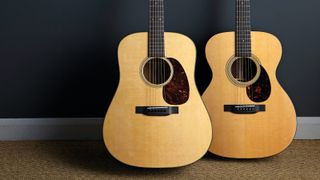 Two Martin acoustic guitars, one natural and one sunburst, leaning against a textured wall
Two Martin acoustic guitars, one natural and one sunburst, leaning against a textured wall
(Image credit: Future)
11. Martin
Best for: Rich heritage, classic acoustic tones, and vintage vibe
C.F. Martin & Company, known simply as Martin Guitars, is one of the most venerable and influential family-owned businesses in American history, and a true giant in the acoustic guitar world.
With a legacy spanning nearly 200 years, Martin has profoundly shaped acoustic guitar design and construction. From popularizing X-bracing, a key structural element in acoustic guitars, to inventing the iconic dreadnought body shape, Martin’s innovations are foundational to the instrument as we know it.
Martin guitars are celebrated for their rich, resonant, and often described as “retro” tone. Models like the legendary D-18, D-28, and HD-35 deliver a powerful, full sound with a robust low-end and exceptional projection. Other Martin instruments, such as the OM-42, 000-28, and 0-18, offer a more focused tone with less bass and greater articulation in the higher frequencies.
(Image credit: Future)
12. Taylor Guitars
Best for: Bright, modern acoustic tones and innovative design
Taylor Guitars is a forward-thinking company committed to producing high-quality instruments with a focus on sustainability and modern playability. Recognized as a leader in flat-top acoustic guitars, Taylor offers contemporary players instruments that are as comfortable and playable as they are sonically pleasing.
Founded in 1974 by Bob Taylor, Kurt Listug, and Steve Schemmer, Taylor Guitars has grown from a small workshop to a major force in the industry. Beyond instrument manufacturing, Taylor has taken a proactive stance on sustainability, even owning an ebony sawmill in Cameroon and actively seeking solutions to the ebony crisis.
Taylor guitars are prized for their clear, crisp, and modern tone. They typically feature a bright upper midrange that allows them to cut through mixes effectively. Taylor’s Grand Auditorium body shape, designated by a “4” in the model number (e.g., x14), has become a flagship design and one of the company’s most popular body styles.
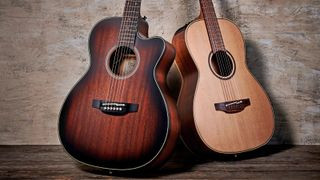 Two Takamine acoustic guitars, one natural and one dark, leaning against a white wall
Two Takamine acoustic guitars, one natural and one dark, leaning against a white wall
(Image credit: Future)
13. Takamine
Best for: Acoustic-electric performance and amplified acoustic tones
Takamine is perhaps best known as a pioneer in acoustic-electric guitar technology, being among the first companies to offer acoustic guitars readily equipped for amplification.
The development of the under-saddle Palathetic pickup was a landmark moment for acoustic guitarists. This innovative pickup system allowed acoustic players to achieve a natural and realistic amplified sound, quickly gaining adoption by many prominent artists in the late 1970s.
Today, Takamine offers a diverse range of models, from the high-end Signature and Pro Series to the more accessible G Series, ensuring there’s a Takamine guitar to suit various playing styles and budgets.
(Image credit: Future)
14. Godin Guitars
Best for: Canadian-made quality and diverse acoustic offerings
The Godin Guitars story began in the early 1970s when Robert Godin started crafting guitars in Quebec, Canada. From humble beginnings, Godin has grown into one of the largest acoustic guitar manufacturers in the world.
Godin produces instruments under several distinct brands, including Godin, Norman, Art & Lutherie, Simon & Patrick, La Patrie, and Seagull. This diverse portfolio allows Godin to cater to a wide range of players and musical styles.
Whether you’re seeking an excellent beginner acoustic guitar, a high-value instrument under $1,000, or a stage-ready workhorse, the Godin family of brands offers a wealth of Canadian-made options.
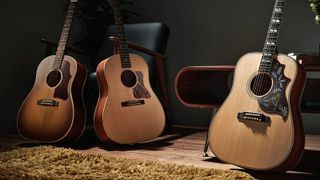 Three Gibson acoustic guitars in different finishes in a dimly lit living room setting
Three Gibson acoustic guitars in different finishes in a dimly lit living room setting
(Image credit: Future)
15. Gibson (Acoustic)
Best for: Workhorse acoustic guitars and strong mid-range tones
While Gibson is primarily recognized for its iconic electric guitars, their acoustic guitar legacy is equally impressive. Alongside legendary electric models like the Les Paul, SG, and ES-335, Gibson has produced a catalog of acoustic icons.
Models such as the J-45 workhorse acoustic, the ornate Hummingbird, and the powerful SJ-200 are among the most coveted flat-top guitars globally.
Gibson acoustic guitars are known for their strong, prominent midrange, making them ideal for band settings where the acoustic guitar needs to project over drums, keyboards, and vocals.
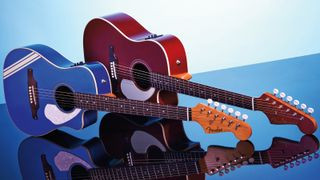 Fender acoustic guitars in various colors and body styles against a blue background
Fender acoustic guitars in various colors and body styles against a blue background
(Image credit: Future)
16. Fender (Acoustic)
Best for: Electric guitar players transitioning to acoustic
Mirroring their electric guitar approach, Fender infuses their acoustic guitars with a distinctive style and flair. While Fender offers some traditional flat-top acoustic models, they are particularly known for acoustics that echo their electric guitar heritage.
These guitars often feature Fender’s signature Stratocaster headstock shape, comfortable electric guitar-style necks, and vibrant Fender color options.
Fender’s innovative Acoustasonic series takes this concept further, providing players with hybrid instruments capable of delivering both acoustic and electric tones in a single guitar.
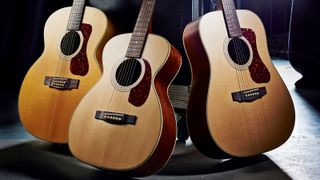 A collection of Guild acoustic guitars in various body shapes and wood finishes
A collection of Guild acoustic guitars in various body shapes and wood finishes
(Image credit: Future)
17. Guild
Best for: Singer-songwriters and balanced, vocal-complementing tones
Guild Guitars’ history dates back to 1952, and their instruments have been embraced by a diverse array of artists, from Bryan Adams and Billie Joe Armstrong to Jeff Buckley and Joe Walsh.
While often perceived as a traditional brand, Guild was a pioneer in its time. Guild was the first manufacturer to produce a dreadnought acoustic guitar with a cutaway. The renowned D-40C provided players with access to higher frets previously unattainable on dreadnoughts, marking a significant innovation in acoustic guitar design.
Guild guitars are cherished for their full-bodied, balanced tone that complements vocals beautifully, making them a favorite among singer-songwriters.
Best Guitar Brands: Buying Advice
(Image credit: Future)
So, how do you determine which guitar brand is the right fit for you? Ultimately, the best approach is to try guitars out firsthand. Each brand offers a unique combination of tone, styling, and playing experience. Visiting a guitar store and spending time with different instruments is invaluable in discovering what resonates with you.
Consider researching the brands favored by your guitar heroes. Are you a dedicated fan of Slash? Then exploring Gibson or Epiphone guitars might be a great starting point. Do you gravitate towards metal? Jackson, Ibanez, or ESP could be ideal brands to investigate. For acoustic players, researching the guitars used by your favorite acoustic artists can provide valuable direction.
Ultimately, there are no definitive “wrong” choices. Select the guitar that feels, sounds, and looks best to you. When you find the right instrument, it will be evident.
Should You Buy from a Boutique Guitar Brand Instead?
Beyond the major mass-produced guitar brands, boutique guitar companies offer another compelling option. What defines a boutique brand? Typically, boutique brands produce instruments in limited quantities, utilizing premium materials and often offering extensive customization options.
Boutique guitars provide a high degree of flexibility and can be tailored to your precise specifications. However, this customization and exclusivity come at a premium price. Popular boutique brands include Fano, Collings, Novo, Suhr, Mayones, and Kiesel.
While the allure of a custom-built boutique guitar is strong, it may not be the most practical choice for every player. In addition to the higher cost, boutique guitars often involve longer wait times for production.
Furthermore, ordering a custom boutique guitar requires a clear understanding of your preferences. Knowing your desired specifications and tonal goals typically comes with experience. Therefore, it’s often advisable to gain experience with standard production guitars before venturing into the world of high-end boutique instruments.
How We Chose the Guitar Brands for This List
You can trust Guitar World. Our expert reviewers dedicate countless hours to testing and comparing guitar products to help you make informed decisions. Find out more about how we test.
At Guitar World, we are deeply immersed in the world of guitars. Our expertise and passion for guitars guide our selection process when showcasing brands.
Our primary goal is to help guitarists find the instruments that are right for them. Before recommending any brand, we thoroughly evaluate a wide range of guitars from that manufacturer to ensure we understand the full spectrum of their offerings.
We meticulously assess build quality, the diversity of available models, and price points. We also consider a brand’s reputation and popularity within the broader guitar community before making our recommendations.

